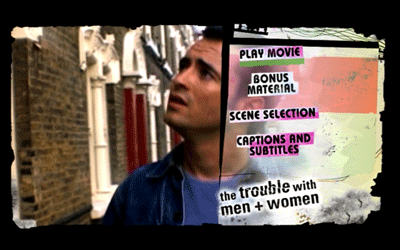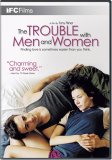| Reviews & Columns |
|
Reviews DVD TV on DVD Blu-ray 4K UHD International DVDs In Theaters Reviews by Studio Video Games Features Collector Series DVDs Easter Egg Database Interviews DVD Talk Radio Feature Articles Columns Anime Talk DVD Savant Horror DVDs The M.O.D. Squad Art House HD Talk Silent DVD
|
DVD Talk Forum |
|
|
| Resources |
|
DVD Price Search Customer Service #'s RCE Info Links |
|
Columns
|
|
|
Trouble With Men & Women, The
THE MOVIE:

The trouble with calling your movie something like The Trouble with Men and Women is you create the expectation that you will actually be providing a little insight into the issue. Granted, the relationship riddle is an ongoing human dilemma that isn't likely to be solved anytime soon, but countless pieces of fiction in every medium are always finding something to say on the topic. At the very least, when the story reaches its end, the spectator will have learned something about what two people are doing to reconcile their love problems. Isn't that what we watch relationship movies for?
The Trouble with Men and Women was written and directed by first-time filmmaker Tony Fisher. It concerns itself with Matt (Joseph McFadden, Small Faces), a clerk at an internet café in London. Matt was recently dumped by his girlfriend (Karen Tomlin), and he keeps running her parting shots over and over in his head, presumably trying to divine what it was she meant by the things she said. His buddies, the ridiculously crass Travis (Vas Blackwood, One Love) and the poseur cynic Vinnie (Matthew Delamere, 8 1/2 Women), have the usual advice: get laid and get over it. But we're lead to believe Matt is a romantic, and not only does he want his sex to mean something, he wants to know that his lost relationship meant something, too.
Presumably.
The Trouble with Men and Women is a bit of a cliché, a gutless indie romance that has absolutely no romance whatsoever. If Matt is as lovelorn as he says he is, then trust me, his memories of a long-term relationship would consist of more than the final conversations with his lover. When he replays the moments where she tells him that she doesn't believe in love, he'd also remember the good times they had in order to cling to them as proof that she was somehow lying, that she really cared. If nothing else, he should remember them for us, because we weren't there and it would be nice to know there is something worth being this mopey about. Fisher fakes it by going to that regular movie fallback: home movie-style shots of the couple running around at the park. No dialogue, no meaningful interaction, just running, falling, and laughing on the grass. Let me say this outright. If you see a movie and it depicts a lost relationship in this manner, it's like an alarm going off to inform you that the writer is emotionally cowardly. He'd like you to think that he's honest because he's embracing the truth and the truth is about pain, but really, he's too chicken to give you what a romantic movie requires. If there were no good times, then there would be no point to being so hurt and upset, you know what I mean?
Instead what Fisher gives us are long scenes of people endlessly talking about relationship myths culled from better-written films like Swingers and sitcoms like Friends. The scenes of Matt being coached on flirting are embarrassingly familiar, and the rundown of possible sexual partners at a party is borderline misogynistic. Point of fact, for a movie called The Trouble with Men and Women, it's really a lot more about the trouble with men and not so much about the women. Matt's new French girlfriend (Karine Ardover) couldn't be more of a Fox News depiction of a French person if she was wearing a beret and smoking a clove cigarette. Vinnie's girlfriend, Susie (Kate Ashfield, Shaun of the Dead), is the closest we get to a real human being in the picture, and if there is any theme or message to be gleaned from The Trouble with Men and Women, it's in her interaction with Matt.
What I think Tony Fisher is trying to say with his film is that the divide isn't between the sexes, but it's an overall problem between the two types of people he presents. Those who believe in love like Matt and Susie invariably date the wrong people, the amateur philosophers like Vinnie. As a character, Vinnie is like a walking example of everything that is wrong with films like this. He has come up with so many reasons not to tell his girlfriend that he loves her, he misses the one very obvious reason--that she's standing right there in front of him and she wants to hear it. It's kind of a simple solution.
Yet, The Trouble with Men and Women is as blind to the answer as Vinnie. It spends so much time not showing us the love, it forgets that's what we put the DVD in our player to see. When romance does come at the end, it's tacked on, and for all the honesty Fisher probably tried to capture, he comes off as the most dishonest when the truth would have mattered the most.

THE DVD
Video:
The Trouble with Men and Women was shot on digital video, and so the disc looks alternately crisp and fuzzy, the sort of low-budget digital look that we can expect from the new technology. That's not a problem with the widescreen transfer, obviously, that's how the movie looks. Given the loose air of realism the director was going for with the movie, it works well in his favor. Some of the handheld shots get a little shaky, but it's not the norm. There are times, though, when you want to take the effects buttons and filters away from the director and his cinematographers. Party scenes are shot like they're for a Wong Kar-Wai film, but without the poetry, and for the one sex scene that's supposed to have a little love in it, Tony Fisher gets all arty on us, resorting to still images and blown-out colors. These moments stick out like a sore thumb, because they feel completely unnecessary.
Sound:
For what sounds like audio recorded live on the scene, the stereo mix on the DVD is pretty good. Scenes in public have a really round sound to them, so much so that in one café sequence, I thought some girls were talking in the courtyard of my apartment building when they really were just in the background of the film.
The disc has English and Spanish subtitles.
Extras:
To Hell With Love is an eighteen-minute short that writer/director Tony Fisher made with producer Christopher Simon that led to them getting the deal to make The Trouble with Men and Women. It's a talky script about a romantic misunderstanding. Ted falls in love with a waitress, writes in detail about his feelings, and then accidentally leaves his journal at the café where she works. The object of his desire finds it, meaning she's more than prepared when Ted's friend Mac, a lying lothario, tries to retrieve it. It's like a blueprint for the romantic entanglements between the cynical and the hopeful, and despite its too-clever-at-times dialogue, it actually works better than the main feature because its characters actually do something about their feelings--even if the ending is a little pat.
FINAL THOUGHTS:
I'm a big fan of relationship stories, and as a fan, I demand they give me something to sink my teeth into. We all know the clichés of why men and women don't get along, and we've seen emotionally needy characters struggle in relationships with the emotionally crippled before. The fatal mistake of movies like The Trouble with Men and Women is not that they travel well-worn ground, however, but that they stop short of the real emotional issues. If you're going to show the effects of a broken heart, then you need to also show the things that filled that heart to make its owner take the risk of it being shattered. The Trouble with Men and Women offers us inane chatter instead, staying completely away from any romance or true emotion until it needs to pull an ending out of the hat. By that time, it's too late, and you'll already have wished that someone had told you to Skip It.

Jamie S. Rich is a novelist and comic book writer. He is best known for his collaborations with Joelle Jones, including the hardboiled crime comic book You Have Killed Me, the challenging romance 12 Reasons Why I Love Her, and the 2007 prose novel Have You Seen the Horizon Lately?, for which Jones did the cover. All three were published by Oni Press. His most recent projects include the futuristic romance A Boy and a Girl with Natalie Nourigat; Archer Coe and the Thousand Natural Shocks, a loopy crime tale drawn by Dan Christensen; and the horror miniseries Madame Frankenstein, a collaboration with Megan Levens. Follow Rich's blog at Confessions123.com.
|
| Popular Reviews |
| Sponsored Links |
|
|
| Sponsored Links |
|
|
| Release List | Reviews | Shop | Newsletter | Forum | DVD Giveaways | Blu-Ray | Advertise |
|
Copyright 2024 DVDTalk.com All Rights Reserved. Legal Info, Privacy Policy, Terms of Use,
Manage Preferences,
Your Privacy Choices | |||||||















